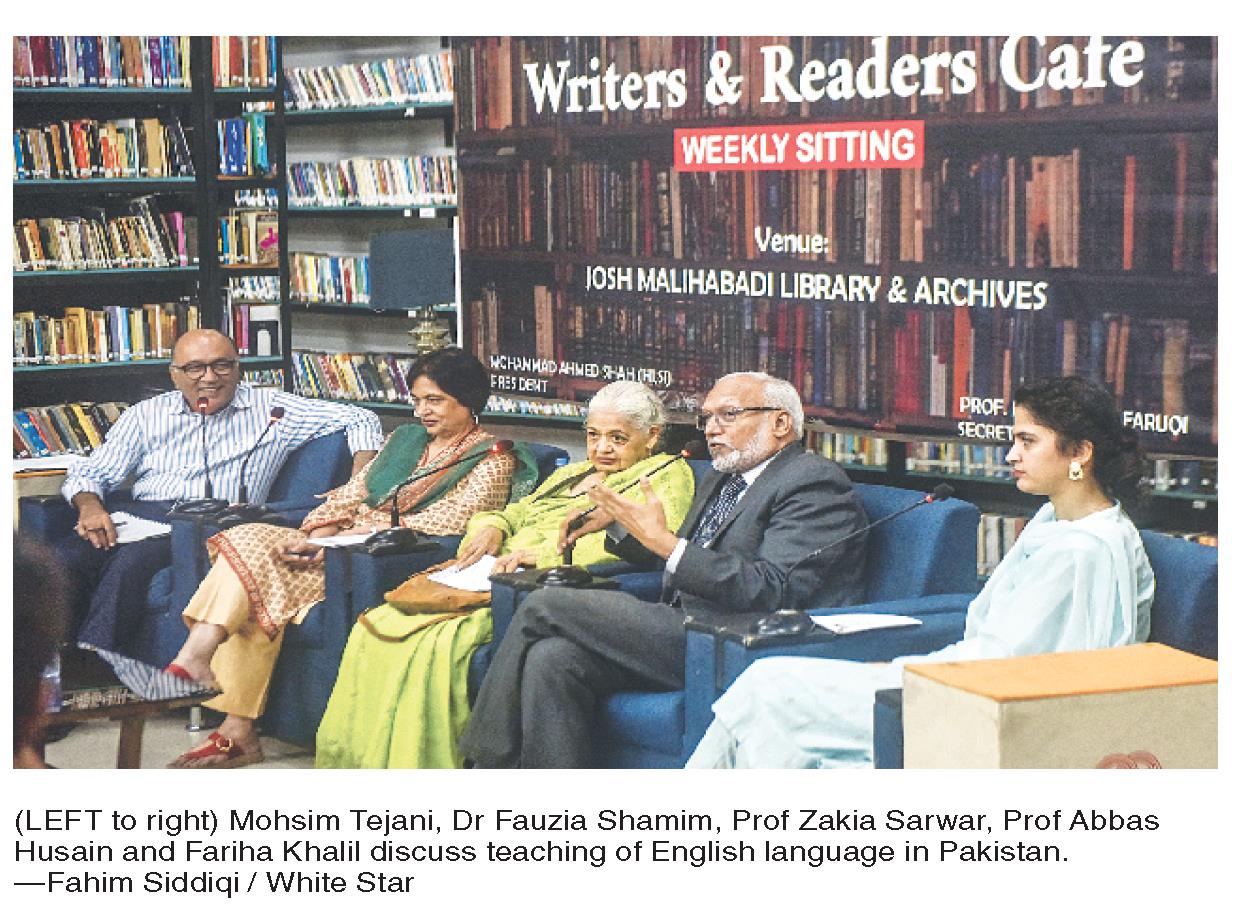Teaching English requires proficiency`
By Shazia Hasan
2025-07-18
KARACHI: As the Society of Pakistan English Language Teachers (SPELT) completes 41 years, the Arts Council of Pakistan, Karachi, held a discussion on its role in English language teaching in the country.
The event was organised at the society`s Josh Malihabadi Library on Thursday as the Arts Council`s weekly feature Writers & Readers Cafe.
A panel comprising SPELT`s senior members including its President Mohsin Tejani, founder and Patron-in-Chief Prof Zakia Sarwar, Vice President Dr Fauzia Shamim, Chair, Outreach Council Prof Abbas Husain and Professional Development Council Fariha Khalil highlighted the story of SPELT in the form of an informal discussion.Mohsin Tejani said that he came to SPELT after teaching at a private school for one-anda-half years back in 1990. `I thought that my teaching would improve if I did my Masters in English Literature,` he said, adding that he was advised to meet Fatima Shahabuddin, who brought him to SPELT where he was able to increase his knowledge of the English language by attending various teachers` training courses.
Speaking about how SPELT was started, Prof Zakia Sarwar said that there used to be a University Grants Commission (UGC) conference in Islamabad where experts used to meet and discuss how education in the country can be improved. `But when so many expertsfromKarachiweregoingtoIslamabad to discuss the same topic, we soon thought about convening such event in our own city while coming up with our own association, which we did in the form of SPELT in 1984, she said.
While pointing out that studying English Literature did not mean that one could teach good English in the classroom Dr Fauzia Shamim said that when she started teaching, she realised that it was quite easy to talk of literature classics, but she felt inadequatewhen her students asked her things such as usage of the word `the` in sentences.
Prof Zakia added that it is also wrongly thought that if one can speak good English, he or she can teach good English, too. `Teaching English is a technical matter,` she said.
Prof Abbas Husain said that the teaching of English in the classroom involves listening, speaking, reading and writing. `These four are proficiency skills needed to teach English, which practising English language teachers are well aware of,` he said, adding that just textbooks, especially, the textbooks published earlier by the Sindh Textbook Board were not of much use in teaching English language.
Prof Fauzia said that at SPELT, their initial challenge was to improve the curriculum.
`And the next challenge was assessment and looking at the relationship between testing and teaching,` she said.
Meanwhile, Fariha Khalil brought up `translanguaging`, which, she explained, was like being multilingual or having the knowledge of different languages together. `I had come to understand this term while studying abroad but out here the simultaneous use of multiple languages is not supported. Translanguaging or mixing languages is not accepted as a valid practice here,` she said.
Dr Fauzia reminded that SPELT acknowledges translanguaging. `Here SPELT realised that Urdu was also being taught as badly as English was being taught. Therefore, we introduced the Urdu strand at our SPELT conferences,` she said.
Coming to another serious matter, Mohsin Tejani wondered aloud about policy. `Why can`t government policy regarding teaching be scaled up?` he asked.
`A nation will not change by writing if there is no culture of reading,` ProfAbbas Husain pointed out. `Here when we talk of change, we get so much negativity. Some older teachers would tell us to just go with the flow, why change courses now when their retirement is just around the corner?` he added.
Fariha Khalil said that there is also resistance towards technology among the teachers. `But they should understand that they will become obsolete if they don`t embrace technology,` she said while reminding that these days artificial intelligence, too, is a requirement in the classroom.
Finally, it was agreed unanimously that if there can be an association of English language teachers working to improve the teaching of English in Pakistan, there can also be similar associations for Urdu, Sindhi and other languages here.




